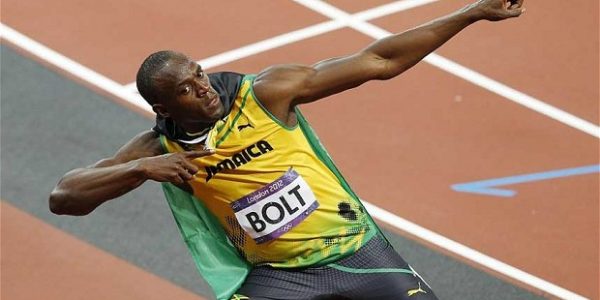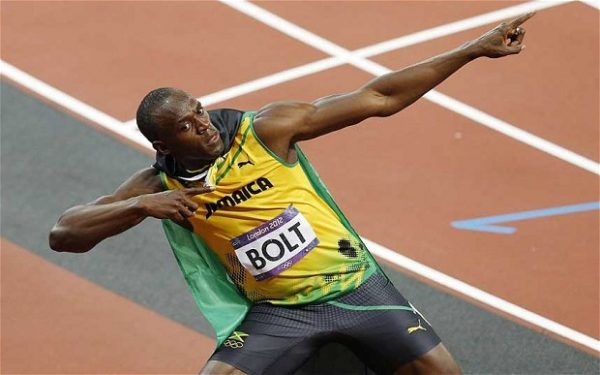
In the 2016 Summer Olympics, Usain Bolt will try to become the first to win the 100 meters event for three times. The world record holder and two-time gold medalist is the current dominant force in the most prestigious Olympics and athletics event, which has mostly been dominated by the United States over the years, with the reign disturbed from time to time over the course of history.
1896: Thomas Burke of the United States won the final with a 12.0 time, beating Fritz Hoffman of Germany. Burke won two golds in Athens, the other in the 400 meters race.
1900: American Frank Jarvis won his first and only Olympic gold medal by running an 11.0 time, beating fellow American Walter Tewksbury by two feet. Tewksbury won two gold medals in Paris: 200 meters and 400 meters hurdles.
1904: The final in St. Louis consisted of only Americans. The winner was Archie Hahn, running an 11.0, beating Nathaniel Cartmell and William Hogenson for gold. He who a gold medal in the 60 meters and 200 meters events too.
1908: The final in London was always going to be a battle between Reggie Walker of South Africa, and James Rector of the United States. Walker became the first non-American to win gold at the event with a time of 10.8 seconds, Rector taking silver with a 10.9. He was only 19 years old at the time.
1912: Ralph Craig brought back the American dominance to Stockholm, as the USA had a 1-2-3 finish. Craig beat Alvah Meyer by 60 centimeters, running a 10.8 to his 10.9. He also won the 200 meters gold in those Olympics.
1920: Charley Paddock of the United States won the gold medal in Antwerp, setting a new Olympic record with a 10.6, beating fellow American Morris Kirksey, while Harry Edward of Great Britain took gold. Paddock also won gold in the 4×100 relay.
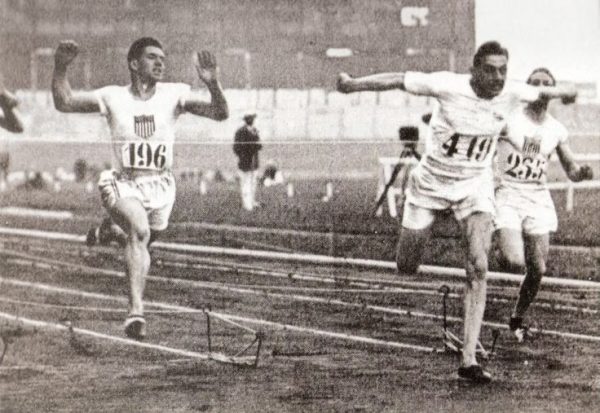
1924: Harold Abrahams won the gold medal for Great Britain in a race and Olympics later depicted in Chariots of Fire. He ran a 10.6 to win the race, finishing ahead of Jackson Scholz of the United States Arthur Porritt of New Zealand.
1928: Held in Amsterdam, the final of 1928 was the first in which no Americans finished in the top 3. Gold went to Percy Williams of Canada, barely beating Jack London of Great Britain and Georg Lammers of Germany. Williams also won the gold in the 200 meters.
1932: Back in the United States, back to American dominance. Eddie Tolan equalled the world record in Los Angeles with a 10.38 to win gold, despite Ralph Metcalfe finishing with 10.38 as well. Tolan won by crossing the line first, although by today’s rules, Metcalfe would have won, reaching the line first. Tolan also won gold in the 200 meters.
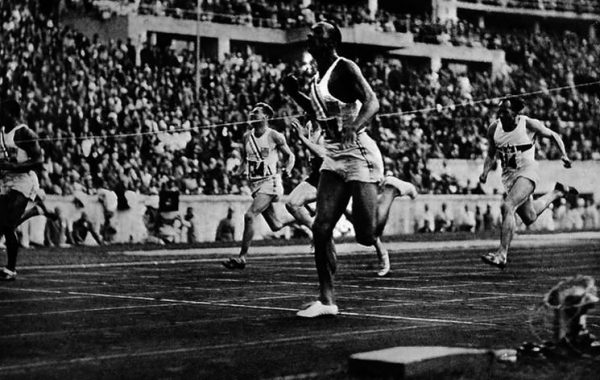
1936: The famous Olympics in Berlin, with Jesse Owens as the star. Owens won the gold medal with a time of 10.3 seconds, beating Ralph Metcalfe and Tinus Osendarp of the Netherlands. Owens won four gold medals in those Olympics, including the 200 meters, long jump and 4×100.
1948: After 12 years of no games, the Olympics returned to London, and more American dominance. Harrison Dillard of the United States matched the Olympic record of 10.3 seconds to win gold, beating Barney Ewell (USA) and Lloyd LaBeach of Panama. Dillard also won the 4×100 in London, and two more gold medals in Helsinki four years later: 110 meters hurdles and 4×100 relay.
1952: On to Helsinki, and the triumph of American Lindy Remigino, barely beating Herb McKenley of Jamaica by 0.01 seconds (10.79 to 10.80). Remigino also won the 4×100 relay gold.
1956: In Melbourne, the runners in the final had to deal with a strong head wind, reaching speeds of a negative 5.5m/s. Bobby Morrow of the United States won with a time of 10.62, beating American Thane Baker and Australia’s Hec Hogan. Morrow also won the 200 meters in Melbourne, as well as the 4×100 relay.
1960: The Olympics were held in Rome, and gave us a rare non American winner in the 100 meters, won by Armin Hary of Germany at 10.2 seconds, just ahead of David Sime of the United States, also stopping the clock at 10.2 seconds. Hary and Germany also won the gold in the 4×100 meters, thanks to an American disqualification.
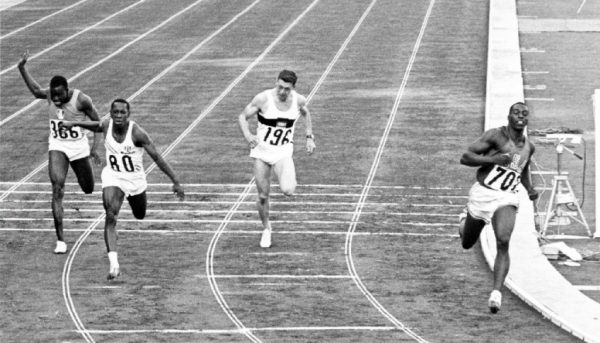
1964: American Bob Hayes won the gold in the Tokyo Olympics, running a 10.0 to beat Cuba’s Enrique Figuerola and Harry Jerome of Canada. Hayes also won the 4×100 gold, and is probably mostly known for his career in the NFL, inducted into the Pro Football Hall of Fame.
1968: The Olympics in Mexico City were the first and last to be held at such altitude. Jim Hines of the United States tied the world record to win gold, running a 9.95, beating Lennox Miller of Jamaica (10.04). Hines was also part of the gold in the 4×100 meters.
1972: In Munich, an Olympics with a dark reputation for the murder of the Israeli athletes, the Soviet Union won the gold medal as Valeriy Brozov ran a 10.14 against a depleted field. Eddie Hart and Rey Robinson were absent from their quarterfinal heats. American sprint coach Stan Wright, apparently working from an outdated schedule and did not have the athletes at the stadium at the correct time. All three qualified American athletes were at the ABC television headquarters known as “Barnathan’s Bungalow” watching what they thought were replays of their morning preliminary races. In fact, they were watching live coverage of the races they should have been in. Hart and Robinson, scheduled in the first two races, missed their heats. The athletes rushed to the stadium, Robert Taylor just taking off his warm up uniform before running his later heat.
1976: In Montreal, no Americans finished in the top 3, as Hasley Crawford won the first ever gold medal for Trinidad & Tobago, running a 10.6 to finish just ahead of Don Quarrie of Jamaica (10.08). Brozov ran a 10.14 to take bronze.
1980: The Olympics in Moscow were boycotted by 65 countries, including the United States, although some athletes from boycotting countries participated under the Olympic flag. The winner was one of them, Allan Wells of Great Britain, winning gold with a time of 10.25, just like Cuba’s Silvio Leonard. His lean before the finish line allowed him to cross first. He became the oldest Olympic 100 m champion at that time at the age of 28 years 83 days.
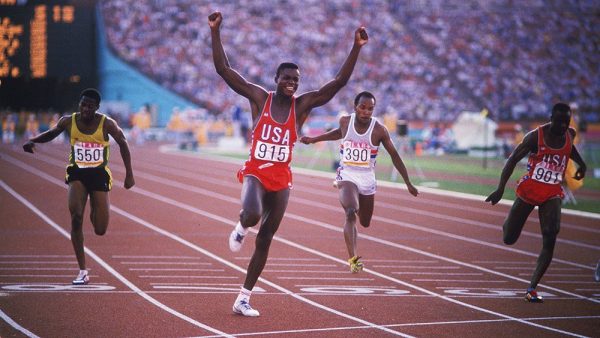
1984: Olympics in Los Angeles, and 14 countries led by the USSR didn’t participate. Carl Lewis became the first American winner since Mexico City, running a 9.99, way ahead of American Sam Graddy and Canada’s Ben Johnson. Lewis has nine Olympic gold medals, including four in 1984: 100, 200, long jump and 4×100 relay.
1988: In Seoul, maybe the most famous 100 meters race of all was held. Ben Johnson won gold with a 9.79 time, but a positive steroid test disqualified him, leaving Carl Lewis with the gold, becoming the first man to win the 100 meters in two different Olympics with a time of 9.92, finishing ahead of Linford Christie of Great Britain (9.97) and Calvin Smith running a 9.99. Lewis broke the world record, and also won the gold in the long jump event.
1992: The Barcelona Olympics saw Britain’s Linford Christie win gold with a time of 9.96, finishing ahead of Frankie Fredericks of Namibia (10.02) and American Dennis Mitchell (10.04). It was Christie’s only gold in Olympic games, becoming the third Brit to win the event.
1996: Held in Atlanta, no Americans were on the podium in the end, as Donovan Bailey smashed the world record by running a 9.84, beating Frankie Fredericks (9.89) and Ato Boldon of Trinidad & Tobago (9.90). Bailey also led Canada to a gold medal in the 4×100 meters relay.
2000: Maurice Greene brought back American dominance in Sydney, running a 9.87 to win the gold medal, while Ato Boldon took silver (9.99) and Obadele Thompson of the Barbados finished third (10.04). Greene also won the gold medal in the 4×100 relay.
2004: In a fantastic final in terms of quality, although with shades of controversy due to Justin Gatlin winning it and later in his career testing positive for PEDs, the American took gold with a time of 9.85, just beating Francis Obikwelu of Portugal (9.86) and Greene, running a 9.87 for bronze. American Shawn Crawford finished fourth with a time of 9.89, and Asafa Powell of Jamaica ran a 9.94 to finish fifth.
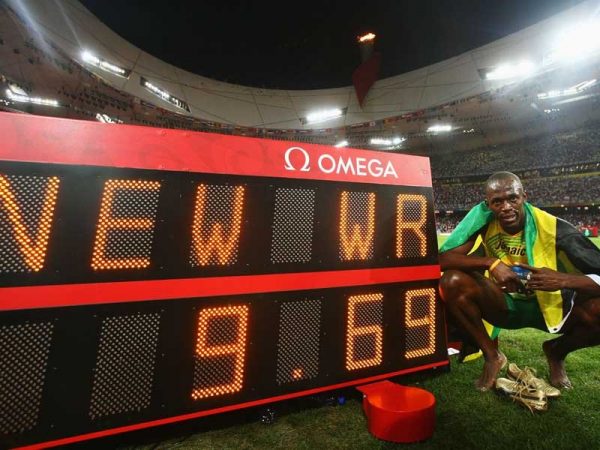
2008: The Usain Bolt reign of dominance began in Beijing, smashing the world record and becoming Jamaica’s first 100 meters gold medalist. He ran 9.69 despite slowing down before the finish line, 0.20 seconds ahead of Richard Thompson of Trinidad & Tobago, 0.22 seconds ahead of American Walter Dix. Bolt also won gold in the 200 meters and 4×100 meters.
2012: More of the same for Bolt, in London this time, once again winning gold medals in 100, 200 and 4×100 meters. This time he didn’t break a world record (he owned from the 2009 world championships), running a fantastic 9.63, a new Olympic record. Yohan Blake of Jamaica came in second at 9.75, Justin Gatlin of the United States took bronze at 9.79.
